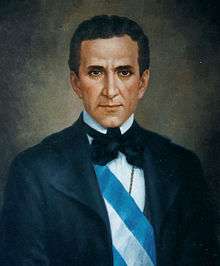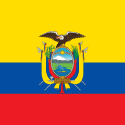José Joaquín de Olmedo
| José Joaquín de Olmedo | |
|---|---|
 | |
| President of Ecuador | |
|
In office March 6, 1845 – December 8, 1845 | |
| Vice President | Pablo Merino |
| Preceded by | Juan José Flores |
| Succeeded by | Vicente Ramón Roca |
| Vice President of Ecuador | |
|
In office 1830–1831 | |
| President | Juan José Flores |
| Preceded by | Position created |
| Succeeded by | José Modesto Larrea |
| Personal details | |
| Born |
March 20, 1780 Guayaquil, Ecuador |
| Died |
February 19, 1847 (aged 66) Guayaquil, Ecuador |
| Spouse(s) | María Rosa Icaza y Silva |
| Alma mater | Universidad Mayor de San Marcos |
| Signature |
|
José Joaquín de Olmedo y Maruri (March 20, 1780 – February 19, 1847) was President of Ecuador from March 6, 1845 to December 8, 1845. A patriot and poet, he was the son of the Spanish Captain Don Miguel de Olmedo y Troyano and the Guayaquilean Ana Francisca de Maruri y Salavarría.
On October 9, 1820, Olmedo and others declared the city of Guayaquil independent from Spain. He was President of the Free Province of Guayaquil until it was united to Gran Colombia by Simón Bolívar against Olmedo's will. He was also twice mayor of Guayaquil.
He was Vice President of Ecuador from 1830 to 1831, and became President of Ecuador from March 6, 1845, to December 8, 1845, surviving an attempted coup on June 18 of that year.
He was also a noted poet who emphasized patriotic themes. His best-known work is La victoria de Junin, which pictures the Latin American fighters for independence from Spain as the legitimate heirs of the Incas.
Olmedo devoted his life to Guayaquil, he created the Guayaquilean flag and shield, and in 1821 he composed the Song to the October Ninth, which would become the Guayaquil Anthem.
He is quoted as saying “He who does not hope to win has already lost.”[1]
The José Joaquín de Olmedo International Airport in Guayaquil is named after him.
Works
During his life, he dedicated part of his time to the creation of novels, songs, poems, and other kinds of literary works. Among his most well known works are: Canto a Bolívar; Al General Flores, vencedor en Miñarica; and Alfabeto para un niño. He designed the flag and crest of Guayaquil and wrote the lyrics of its anthem.
In 1808 he was inspired to compose the prologue to the tragedy El Duque de Viseo de Quintana and his poem El Árbol, which he finished in 1809. El Árbol contains two parts: one that is philosophical and has great aesthetic sense, and one that is less carefully constructed which ends the poem. This makes it seem as if there were two distinct verses brought together.
In January of 1811 he was still in Mexico and read his poem Improntu.
In the beginning of 1817 he traveled to Lima and wrote A un amigo, don Gaspar Rico....
In 1821 he wrote Canción al 9 de octubre, considered to be the first anthem of the Ecuadorian territory.
In 1823 in Lima he edited his 45 page translation from English of Essay on Man by Alexander Pope.
In 1825 he composed Marcha and the poem La Libertad.
In 1837 he wrote Canción del 10 de agosto, which served as a precursor to the current national anthem as demonstrated by Espinosa Pólit.
In 1840 he wrote En la muerte de mi hermana. In 1843 he edited Ocios poéticos del General Flores y una oda en su obsequio in 52 pages.
From them on his poems began to be published with great success. In 1848 a volume of Obras Poéticas, a collection revised and corrected by Olmedo, was released in Valparaiso months before his death. The second edition was issued in Paris in 1853, with 214 pages. There are later publications as well.
References
- ↑ Jose Joaquin Olmedo. Search Quotes
External links
| Wikimedia Commons has media related to José Joaquín de Olmedo. |
- Official Website of the Ecuadorian Government about the country President's History
- Works by or about José Joaquín de Olmedo at Internet Archive
- Works by José Joaquín de Olmedo at LibriVox (public domain audiobooks)

| Political offices | ||
|---|---|---|
| Preceded by Position created |
Vice President of Ecuador 1830–1831 |
Succeeded by Modesto Larrea y Carrión |
| Preceded by Juan José Flores |
President of Ecuador 1845 |
Succeeded by Vicente Ramón Roca |
